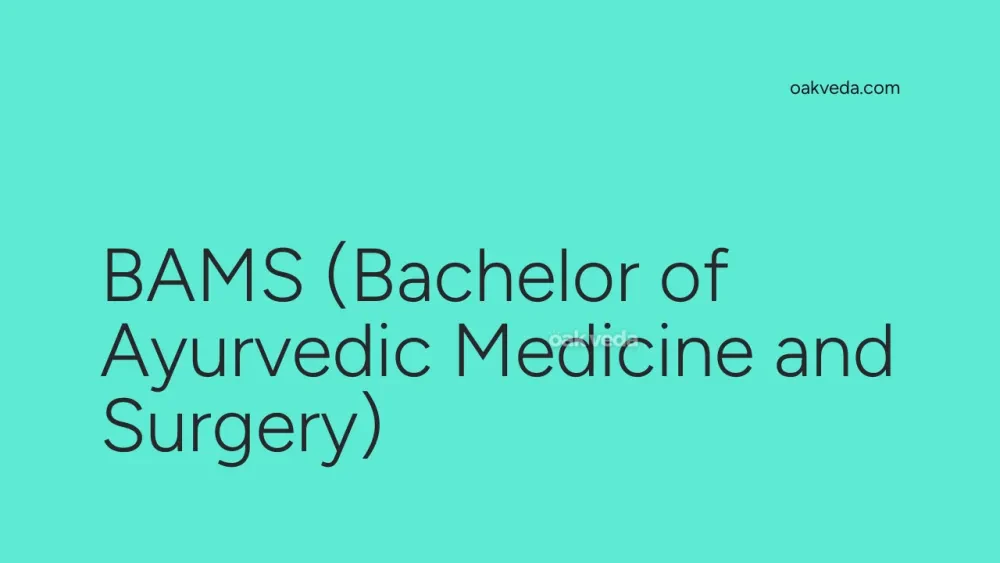
What is the Full Form of BAMS?
BAMS is the abbreviation for Bachelor of Ayurvedic Medicine and Surgery. This comprehensive medical degree program integrates the ancient wisdom of Ayurveda with modern medical practices, offering students a unique blend of traditional and contemporary healthcare knowledge.
What is Bachelor of Ayurvedic Medicine and Surgery?
Bachelor of Ayurvedic Medicine and Surgery is a five-and-a-half-year undergraduate program that equips students with the knowledge and skills to practice Ayurvedic medicine. The course combines theoretical study with practical training, covering various aspects of Ayurveda, modern medicine, and surgical techniques.
Origin and Development of BAMS
The BAMS program originated from the need to standardize Ayurvedic education in India. It was developed to create a structured curriculum that preserves the essence of traditional Ayurvedic practices while incorporating modern medical advancements. The course has evolved over the years to meet the changing healthcare needs and regulatory requirements.
How does the BAMS Program Work?
The BAMS program is designed to provide a comprehensive education in Ayurvedic medicine. Here's an overview of how the program works:
- Duration: The course spans 5.5 years, including 4.5 years of academic study and 1 year of compulsory internship.
- Curriculum: Students study subjects like Ayurvedic philosophy, anatomy, physiology, pharmacology, and modern medical sciences.
- Practical Training: Hands-on experience is gained through clinical rotations and laboratory work.
- Internship: The final year is dedicated to practical training in Ayurvedic hospitals and clinics.
Types of Courses in BAMS
While BAMS is a single degree program, it encompasses various specialized areas of study within Ayurvedic medicine:
- Dravyaguna (Ayurvedic Pharmacology)
- Rasashastra (Ayurvedic Pharmaceuticals)
- Kayachikitsa (Internal Medicine)
- Panchakarma (Detoxification Therapies)
- Shalya Tantra (Surgery)
- Kaumarbhritya (Pediatrics)
Functions of BAMS Practitioners
BAMS graduates play crucial roles in the healthcare system:
- Diagnosing and treating diseases using Ayurvedic principles
- Prescribing herbal medicines and dietary recommendations
- Performing Panchakarma and other Ayurvedic therapies
- Conducting research to validate and improve Ayurvedic treatments
- Promoting preventive healthcare through Ayurvedic lifestyle practices
Applications of BAMS
The knowledge gained through a BAMS degree has wide-ranging applications:
- Clinical Practice: Setting up private Ayurvedic clinics or working in hospitals
- Research: Conducting studies on Ayurvedic medicines and therapies
- Pharmaceutical Industry: Developing and manufacturing Ayurvedic products
- Wellness Centers: Offering Ayurvedic treatments in spas and resorts
- Academia: Teaching Ayurvedic principles in educational institutions
Features of BAMS Education
The BAMS program offers several unique features:
- Holistic Approach: Integrates mind-body-spirit concepts of Ayurveda
- Personalized Medicine: Teaches individualized treatment based on patient constitution
- Natural Remedies: Focuses on herbal medicines and non-invasive therapies
- Preventive Care: Emphasizes disease prevention and health promotion
- Modern Integration: Incorporates relevant aspects of modern medical science
Benefits of Pursuing BAMS
Choosing to study BAMS offers numerous advantages:
- Growing Demand: Increasing global interest in alternative medicine
- Diverse Career Options: Opportunities in clinical practice, research, and industry
- Holistic Healing: Ability to offer natural, side-effect-free treatments
- Cultural Preservation: Contributing to the continuation of traditional medical knowledge
- Personal Growth: Developing a deeper understanding of health and wellness
Limitations or Challenges of BAMS
While BAMS offers many benefits, it also faces some challenges:
- Limited recognition in some countries outside India
- Need for more standardized research to validate Ayurvedic treatments
- Competition from other systems of medicine
- Misconceptions about Ayurveda among the general public
Future Developments in BAMS Education
The field of Ayurvedic medicine and BAMS education is continually evolving:
- Integration of advanced diagnostic tools with Ayurvedic principles
- Increased focus on evidence-based research in Ayurveda
- Development of new Ayurvedic formulations using modern technology
- Expansion of BAMS programs to more countries worldwide
FAQs on BAMS Full Form
-
What is the eligibility criteria for BAMS? Candidates must have passed 12th class with Biology, Physics, and Chemistry, securing at least 45-50% marks from a recognized board.
-
Is NEET required for BAMS admission? Yes, admission to BAMS programs is now based on the National Eligibility cum Entrance Test (NEET) scores.
-
What are some top colleges offering BAMS in India? Some renowned institutions include IMS Varanasi, BHU Varanasi, National Institute of Ayurveda Jaipur, and Rajiv Gandhi University of Health Sciences Bangalore.
-
What career opportunities are available after completing BAMS? Graduates can work as Ayurvedic doctors, researchers, drug specialists, or in the pharmaceutical industry.
-
Can BAMS graduates practice outside India? While Ayurveda is gaining popularity globally, recognition and practice regulations vary by country. It's essential to check the specific requirements of the country where you wish to practice.
In conclusion, BAMS offers a unique opportunity to study and practice an ancient healing system in a modern context. As the world increasingly recognizes the value of holistic and preventive healthcare, the importance of BAMS education and Ayurvedic medicine continues to grow.
You may be interested in:

